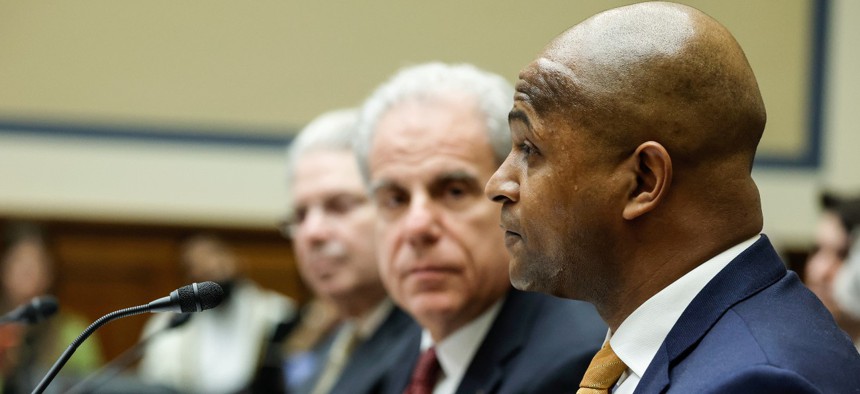
David Smith, (right), assistant director of the U.S. Secret Service's Office of Investigations; Michael Horowitz, chair of the Pandemic Response Accountability Committee; and, Gene Dodaro, comptroller general and head of the Government Accountability Office during the House Oversight and Reform Committee hearing on Wednesday. The committee held the hearing to discuss COVID pandemic federal spending. Anna Moneymaker/Getty Images
Watchdogs to Congress: Keep the COVID-Era Data Center
The first hearing of the House Oversight and Accountability for the 118th Congress focused on pandemic money and fraud.
Government watchdogs implored lawmakers on Wednesday to keep in place the data analytics center established for COVID-19 oversight beyond the scheduled end date so that it can be a major asset to the federal government.
The House Oversight and Reform Committee held its first hearing of the 118th Congress on Wednesday. Michael Horowitz, chair of the Pandemic Response Accountability Committee and Justice Department inspector general; Gene Dodaro, comptroller general and head of the Government Accountability Office; and David Smith, assistant director of investigations for the Secret Service, testified and described the challenges and success of almost three years of working to curb pandemic fraud.
“What the [Pandemic Response Accountability Committee] has developed over the past two years is a new model for conducting oversight in a crisis,” said Horowitz in his prepared statement. “It is a data-driven model that draws on the existing capabilities of the oversight community and surges capacity where needed.” PRAC is one of three oversight entities created by the CARES Act, enacted in March 2020.
Specifically, PRAC developed the Pandemic Analytics Center of Excellence, using funds from the American Resource Plan, which was similar to the Recovery Operations Center developed in 2009 for oversight of the Recovery Act. It currently has more than 36 datasets with more than 992 million records that can be shared with IG offices. Horowitz asked Congress to consider legislation to maintain the center beyond PRAC’s sunset date of Sept. 30, 2025.
“The sustainment of the [analytics center] and its capabilities will ensure that our federal government is equipped with resources to face avoidable oversight risks when our country encounters its next crisis that requires emergency relief funding and effective oversight of that funding, as well the annual federal government funding that Congress appropriates,” Horowitz said. “Failure to do so will result in the oversight community losing an invaluable resource, as we did when the [Recovery Operations Center] sunset in 2015.”
He cited the fraud alert his committee issued on Monday saying that this week alone they identified $5.4 billion in potentially fraudulent pandemic small business loans and grants that were obtained through over 69,000 “questionable” social security numbers as a successful use of data analytics. That monetary amount is 360 times the annual cost of operating the data center, he added.
To date, the work of the committee’s fraud task force and its IG partners “have resulted in hundreds of criminal convictions, lengthy jail sentences for wrongdoers, and the recovery of more than $1 billion,” said Horowitz. Also, the committee’s participation, with 30 other agencies in the Justice Department’s COVID-19 fraud enforcement task force, as of December 2022, “resulted in criminal charges against more than 1,800 defendants with losses estimated at $1.3 billion, the seizure of more than $1.2 billion in relief funds, and civil investigations into more than 1,800 individuals and entities for alleged misconduct of pandemic relief loans totaling more than $6 billion.”
Dodaro agreed with the need for a sustained data analytics center, saying “fraud occurs in regular federal programs all the time as well as improper payments,” this permanent center “would not only deal with regular fraud, but it would be ready and there when emergencies occur.” He noted that GAO previously recommended that Congress and the Treasury Department maintain the Recovery Operations Center’s functions, but they did not do so.
Dodaro also made the following overall observations: agencies should have been better prepared to curb fraud (noting that agencies have been slow to implement the Fraud Reduction and Data Analytics Act, enacted in June 2016); the urgency to provide relief funds led to a trade-off with accountability and transparency; and the federal government has an underlying and years long improper payment problem that was exacerbated by the pandemic.
GAO has found that between March 2020 and mid-January 2023 at least 1,044 individuals have pled guilty or were convicted for federal changes for defrauding COVID-19 relief programs. Smith said that the Secret Service has seized over $1.43 billion in fraudulently obtained funds since 2020. Also, it has initiated more than 230 unemployment insurance fraud investigations and inquiries.
Rep. James Comer, R-Ky., committee chairman, has long been criticizing the Democrats for allegedly not conducting sufficient oversight when they were in the majority. Rep. Jamie Raskin, D-Md., ranking member on the committee, took issue with that, accusing the Republicans of “cherry picking” facts.







